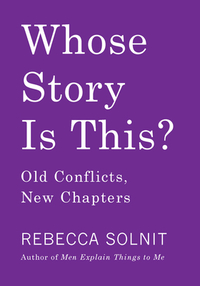Take a photo of a barcode or cover
informative
inspiring
reflective
medium-paced
emotional
reflective
medium-paced
Did I learn a lot of new things? No, but a couple things. I do however, like a different but familiar way of looking at something. We have a lot of the same ideology but, somehow she made me think a little harder about things. I think this book would be amazing for a newer feminist but just a refresher on modern things we need to fix. She even talks about social norms that hurt men, and I appreciate that.
4.5 stars
I love that Haymarket is publishing Solnit's essays each year, and this collection is a bumper crop. She's at her best when discussing gender and #MeToo is a big theme here, as well as how movements for change get started, and how the affect that change over time.
Many of these essays resonated with me personally. How the stories of the marginalized need to be not only heard, but believed. How women (and men who believe women) in media helped expose serial abusers. How the current US president is gaslighting the country, and how that gaslighting affects us as a culture as well as as individuals. How necessary change can seem daunting and impossible, but seemingly small movements can do much of the work, sometimes in unexpected ways.
While the experiences of LGBTQIA+ folx and people of color are gestured at I would have liked to see a bit more intersectionalism. I'm looking forward to reading reviews by folks of color in particular because I am sure there are racial dimensions both Solnit and I missed.
Whose Story Is This stretched my thinking, filled my notebook with notable passages, and gave me hope that we can work our way out of some big, scary problems we're facing as a country and a society. It's right up there with [b:Men Explain Things to Me|18528190|Men Explain Things to Me|Rebecca Solnit|https://i.gr-assets.com/images/S/compressed.photo.goodreads.com/books/1393447237l/18528190._SX50_.jpg|26233826] as my favorite Solnit collection.
Thanks to Haymarket Books for providing a review copy.
I love that Haymarket is publishing Solnit's essays each year, and this collection is a bumper crop. She's at her best when discussing gender and #MeToo is a big theme here, as well as how movements for change get started, and how the affect that change over time.
Many of these essays resonated with me personally. How the stories of the marginalized need to be not only heard, but believed. How women (and men who believe women) in media helped expose serial abusers. How the current US president is gaslighting the country, and how that gaslighting affects us as a culture as well as as individuals. How necessary change can seem daunting and impossible, but seemingly small movements can do much of the work, sometimes in unexpected ways.
While the experiences of LGBTQIA+ folx and people of color are gestured at I would have liked to see a bit more intersectionalism. I'm looking forward to reading reviews by folks of color in particular because I am sure there are racial dimensions both Solnit and I missed.
Whose Story Is This stretched my thinking, filled my notebook with notable passages, and gave me hope that we can work our way out of some big, scary problems we're facing as a country and a society. It's right up there with [b:Men Explain Things to Me|18528190|Men Explain Things to Me|Rebecca Solnit|https://i.gr-assets.com/images/S/compressed.photo.goodreads.com/books/1393447237l/18528190._SX50_.jpg|26233826] as my favorite Solnit collection.
Thanks to Haymarket Books for providing a review copy.
hopeful
informative
inspiring
lighthearted
reflective
fast-paced
Brilliant collection of thought-provoking essays that is hard to summarize as a whole. The essays are US-centric but the themes are universal: how can we escape the hero/villian narrative, and how can we make sure that everyone's voices are heard?
Some of my favourite essays were 'City of Women' (would I feel and act differently if I saw more representations of myself in statues and street names?), 'Whose Story (and Country) Is This?' (questioning why the post-2016 election narrative encourages the left to understand and reconcile with 'middle America', who are in fact a minority), and 'Voter Suppression Begins At Home' (domestic abuse, gender imbalance, and postal votes).
Read as part of Our Shared Shelf.
Some of my favourite essays were 'City of Women' (would I feel and act differently if I saw more representations of myself in statues and street names?), 'Whose Story (and Country) Is This?' (questioning why the post-2016 election narrative encourages the left to understand and reconcile with 'middle America', who are in fact a minority), and 'Voter Suppression Begins At Home' (domestic abuse, gender imbalance, and postal votes).
Read as part of Our Shared Shelf.
hopeful
informative
inspiring
reflective
medium-paced
This was such a beautifully written and curated series of essays, on subjects including feminism, climate activism and racial justice, and the interconnectedness of each essay showed what Solnit was trying to tell us: that everything is connected in our world and even small actions can lead to big changes. I found this really inspiring and will definitely pick it up when I’m in need of courage.
What I love about Rebecca Solnit is that she unflinchingly speaks about the many ways our world is profoundly messed up--but she also always, always leaves me feeling hopeful.
emotional
informative
slow-paced
These were the perfect bite-sized pieces to occupy my time on my daily commute—I usually like to read light fare on the bus, but I found these essays to be perfectly suitable as well, something I couldn't say of other feminist works. Some cite it as one of Solnit's detractors, but she has a rather peculiar take on feminist discourse—an optimistic one. And by that I don't mean that it's the sort of white feminism that doesn't touch on intersectional issues, pretending they don't exist, but rather the fact that she chooses to focus on the progress already made, and how that will impact the challenges still ahead, rather than writing from a grim, confrontational place as so many others do. It's refreshing, and I think that's why she's so popular; it's a hopeful and palatable sort of feminism that doesn't offend because it doesn't directly call for action and doesn't offer clear-cut solutions, but rather appraises what's already happened, or is happening, and why it matters. She makes her points in such a simple, rational way that most people who are in any way left-leaning will wholeheartedly agree. As far as feminist writing goes, this is as light as it gets, which doesn't mean that it isn't worthwhile or good—just not groundbreaking. But there is something to be said about writing so agreeable that people who otherwise wouldn't think about certain issues will still read it, and perhaps think about it. With its simplicity and hopefulness, it has the potential to be a catalyst for change, thanks to its mass market appeal.
This collection felt much more cohesive than the other one I've read—as the title suggests, it concerns itself with who shapes the political, social, historical, etc. narratives; who wields the power to shape what reality we live in, whose side of the story is believed, and what sort of past is remembered. The most recurring themes in Whose Story Is This? are #MeToo, climate change, and the power of group movements to cause slow but steady shifts in perspective over long periods; small cultural changes that pave the way for watershed moments like the Supreme Court ruling that legalized same sex marriage in all US states. Those aren't the sort of dramatic and inspirational stories about individual "heroes" people generally like to hear about, and no one will ever make a blockbuster Hollywood movie about them, but these many unnamed and unsung heroes are the ones with the power to lay the groundwork for significant change, because any movement is more than the sum of its parts.
—————
Note: I received an ARC of this book in exchange for an honest review.
This collection felt much more cohesive than the other one I've read—as the title suggests, it concerns itself with who shapes the political, social, historical, etc. narratives; who wields the power to shape what reality we live in, whose side of the story is believed, and what sort of past is remembered. The most recurring themes in Whose Story Is This? are #MeToo, climate change, and the power of group movements to cause slow but steady shifts in perspective over long periods; small cultural changes that pave the way for watershed moments like the Supreme Court ruling that legalized same sex marriage in all US states. Those aren't the sort of dramatic and inspirational stories about individual "heroes" people generally like to hear about, and no one will ever make a blockbuster Hollywood movie about them, but these many unnamed and unsung heroes are the ones with the power to lay the groundwork for significant change, because any movement is more than the sum of its parts.
"If you think you're woke, it's because someone woke you up, so thank the human alarm clocks. It's easy now to assume that one's perspective on race, gender, orientation, and the rest are signs of inherent virtue, but a lot of ideas currently in circulation are gifts that arrived recently, through the labor of others."
—————
Note: I received an ARC of this book in exchange for an honest review.








